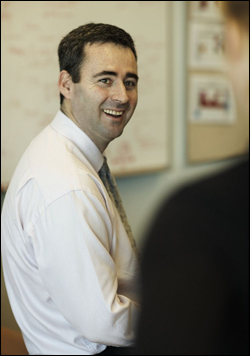Michael Malone is buzzing with excitement.
It’s 11AM in the morning and the chief executive of Australia’s third-largest internet service provider iiNet is striding around his company’s Sydney offices, his eyes alight with passion and a big smile on his face.
In one hand, Malone holds a can of energy drink, from which he takes a swallow occasionally. He uses the other to gesture and make points as he nuts out the next few hours with his communications team. Occasionally he pulls out his iPhone and checks Twitter for the latest news. He nods at passing staff, greeting them by name and smiling.
He’s just done an interview with one journalist, and there’s another one lined up. At midday he’ll address staff in iiNet’s Perth, Sydney and Auckland offices in an all-hands meeting. Then, in only a couple of hours he’ll be on Sky News.
Of course, Malone’s image is already being beamed around the nation to millions of Australian televisions, his voice echoing through the radio. And his company’s name is all the internet can talk about.
This is because it’s Thursday the 4th of February, 2010. Last Thursday. The day Malone and his team won a landmark BitTorrent piracy case in Australia’s Federal Court against a huge coalition of film and television studios.
When I ask him if he’s excited, he says: “Wouldn’t you be?”
Once Malone has finished his hectic day, he’s due to head off to a special event to be held at the Sydney office of the Maddocks law firm. The event is being held by the Internet Society of Australia, with the aim of recognising iiNet’s contribution to the local internet industry over the past decade.
Ironically, the event was scheduled in November, before the verdict date for iiNet’s battle against the studios and the Australian Federation Against Copyright Theft was known. This morning’s victory just means the celebration will be even more poignant for Malone and others attending, such as industry stalwart John Lindsay, carrier relations manager at fellow ISP Internode.
“@iiNet staff and friends will be at Ivy from 7pm. Please drop in to say hi and join our relief on #iitrial,” Malone tweets at 5:42PM. For those who don’t know it, Ivy is probably Sydney’s coolest nightclub — it’s on multiple levels and it’s all glamour.
“I’m all iiPartied out … great industry night,” Lindsay tweeted that night just before midnight to Internode chief Simon Hackett, who earlier on showed his support for iiNet’s win, tweeting “w00T!” to Malone just after the judgement was handed down. Hackett later responded to Lindsay: “party on, dudes :)”.
But Malone’s journey hadn’t finished yet.
On Friday morning, less than 24 hours after the trial verdict, the iiNet chief was scheduled to catch an early flight back to Perth. Then he had a couple of days to relax booked in, before flying out to check on iiNet’s operations in Cape Town, South Africa, and give the staff there the good news.
Sitting with Malone in the lunchroom used by his Sydney call centre staff after the verdict was handed down, one can’t escape the sense that the executive is having the time of his life. He hasn’t lost his passion for the ISP industry, 16 years after he founded (in his garage) the company he continues to lead.
“Absolutely!” he replies, when asked if the passion is still there, agreeing that his job is one where he gets the chance to change the world. “Because you wake up every morning thinking, there’s so much to do.”
Malone’s excitement and positivity shines through in his professional dealings. Minutes after handing the film and TV studios a stunning defeat in the piracy trial, which had Australia’s telecommunications industry — and half of the nation’s technology enthusiasts — sitting on the edge of their seats watching blow by blow updates via Twitter, Malone offered to partner with those he just defeated.
“We’re delighted with the result, obviously […] but the most important thing is that we’d now like to find a way to engage with the movie studios and other rights holders to see if we can find a way to get this stuff legitimately online,” he told a media scrum.
There are many views on what iiNet should do about its customers illegally downloading copyrighted content, and the film and TV studios are unlikely to stop their pursuit of those who do so. Even the question of whether they will appeal the case is still up in the air, after AFACT issued a tersely worded statement following the trial that it would consider its options.
However, his magnamious response shows Malone bears the studios no ill will for attempting to enforce the law; he clearly hopes that the content providers will take a different path and engage with his company on commercial terms for mutual profit — rather than on a legal footing on opposite sides of a courtroom.
Malone’s approach reflects his beliefs that Australia’s ISP industry is moving into a crucial third phase of its existence.
After modern internet technology was developed and brought into Australia in the 1970’s and 80’s, he says, and after the 90’s and 2000’s saw widespread broadband adoption, the next phase is for content and applications to be built on top of the internet “pipes” that companies like iiNet provide.
“My kids are now growing up in a world where the internet is like electricity. They are starting to think about things that we won’t even imagine. The classic digital natives,” he says.
Malone’s vision is one which sees Australians using the internet to create remarkable next-generation applications and to distribute content in a way that has never before been possible.
For example, iiNet is slowly building up the amount of content it hosts on its own ‘Freezone’ servers. This is content its customers can download without worrying about usage quotas. iiNet customers can find sport, news, movies, music and more via the service, from brands like Bloomberg, Apple iTunes, the ABC and FoxSPORTs.
iiNet also hopes to launch broader IPTV services — digital television via the internet — in the next quarter, giving customers the style of access Malone says has been popular overseas in countries like France. “Now broadband is starting to reach the end — saturation of the market,” he says. “But now we’re looking at content becoming a driver.”
The night before the trial verdict, Malone was forced to catch a midnight flight from Perth to Sydney to catch the verdict that morning. The reason? He had to give a speech that night to the eGroup WA Association, a group established in October last year to provide a forum for online entrepreneurs.
The iiNet CEO’s enthusiasm even extends to Telstra, Australia’s largest telco and traditionally one of iiNet’s biggest rivals — as well as one of its major suppliers of wholesale services.
Malone says the Federal Government’s National Broadband Network project has the potential to put Telstra on “the same side of the table” as the rest of the ISPs by making it a customer of the NBN Company. “It’s quite exciting,” he says, “because at some level we all actually want to be proud of Telstra. In the same way that, despite their issues, we’re all proud of Qantas. It’s our national airline.”
When you look at Australia’s ISP industry as a whole over the past decade, it’s hard to deny the effect that executives like Malone and compatriots like Internode’s Simon Hackett, Pipe Networks’ Bevan Slattery and Netspace’s Stuart Marburg have had.
The executives had been at the forefront of generating competition and innovation in the industry, and continue to do so.
Does Malone ever get stressed or worried? “As soon as I heard the decision was today, I started worrying about it; that’s human nature, you can’t help that,” he says.
But in the end it’s his positivity that characterises the iiNet chief. That and a relentless energy to drive change and make things better.
Image credit: iiNet


